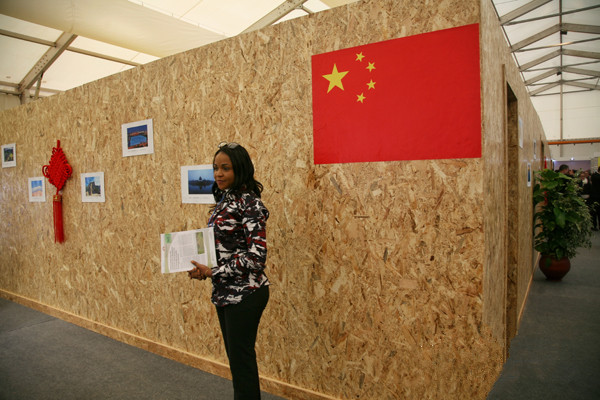COP22 brings China's role in climate governance to spotlight

A participant poses in front of photographs at the China Pavilion of the COP22 that kicked off on Nov. 7 and will last until Nov. 18 in Marrakesh, Morocco.
Commenting on ongoing UN climate talks in Marrakesh, academics have expressed concern about how China can assume its responsibilities as a major country in the international arena and promote global climate governance cooperation.
The 22nd session of the Conference of the Parties (COP22) to the United Nations Framework Convention on Climate Change (UNFCCC) is taking place in the southern Moroccan city from Nov. 7 to 18.
China is playing an increasingly significant role in global climate governance, said Wang Yi, deputy director of the Institutes of Science and Development at the Chinese Academy of Sciences. The development of emerging economies like China has brought dramatic changes to the entire world pattern—not only in traditional political and military spheres but also in terms of the environment and natural resources.
The modernization of emerging economies and underdeveloped countries results in more emissions as well as the consumption of more resources and energy, underscoring the importance of global climate governance, Wang said.
Meanwhile, Wang pointed out the coexistence of opportunities and challenges. While high levels of pollutants in water, air and soil continue to plague some regions, the energy structure still has much space to transform, which is closely tied to overall socioeconomic development.
Li Junfeng, director of the National Center for Climate Change Strategy and International Cooperation, said that performing the international responsibility of emission reduction should go hand in hand with realizing the 2020 poverty alleviation goals. While the former requires long-term endeavors and the latter is a short-term objective, the two are not conflicting, Li said.
As a non-traditional security issue, climate governance now enjoys an equal footing with traditional issues and even intertwines with them, Wang said, adding that countries around the world should join forces to cope with numerous challenges in environmental and climate governance in order to attain goals in the 2030 Agenda for Sustainable Development.
In June 1992, the UN Conference on Environment and Development in Rio de Janeiro, Brazil, reached a consensus on a sustainable path and set a total of 16 goals. So far these efforts have yielded a series of outcomes, including the UNFCCC, the first agreement of its kind by the international community to tackle global warming cooperatively.
China has since committed to solving problems related to green development according to the framework convention and promulgated policies to push ahead with domestic sustainable development.
For example, the Report of the 17th National Congress of the CPC raised the concept of “ecological progress,” incorporating it as an important strategy for state governance and construction. The Report of the 18th National Congress of the CPC further highlighted ecological progress, integrating it in every aspect of economic, political, cultural and social construction.
In 2014 and 2015, China’s consumption of coal declined, and renewable forms of energy were able to meet new demand. In 2015, its actual coal power generation grew by 0.2 percent only, achieving close to zero growth. By implementing projects in green power dispatching and renewable energy, as well as strengthening people’s awareness of environmental protection, China has contributed to the 2030 Sustainable Development Goals.
The challenges posed by climate change necessitate active international cooperation, an important component of which is South-South Cooperation. Yu Hongyuan, director of the Institute for Comparative Politics and Public Policy under Shanghai Institutes for International Studies, said that South-South Cooperation on climate change should be founded upon infrastructure construction and economic collaboration.
From field investigations into Latin American and African countries, Yu found that nations on the two continents fall short when it comes to infrastructure and climate governance professionals. Talent training programs and infrastructure construction projects like establishing climate observatories are crucial when aiding in local green development and advancing international cooperation, Yu said.
A low-carbon economy is an end result that will necessarily be achieved through modernization and economic growth, Yu said, pinpointing challenges facing green development, like the “middle-income trap” and weak momentum. Among others, how to sidestep the “middle-income trap” is the biggest challenge of all for China to become a low-carbon, modernized and developed country, Yu added.
Zhao Yuan is a reporter at the Chinese Social Sciences Today.
